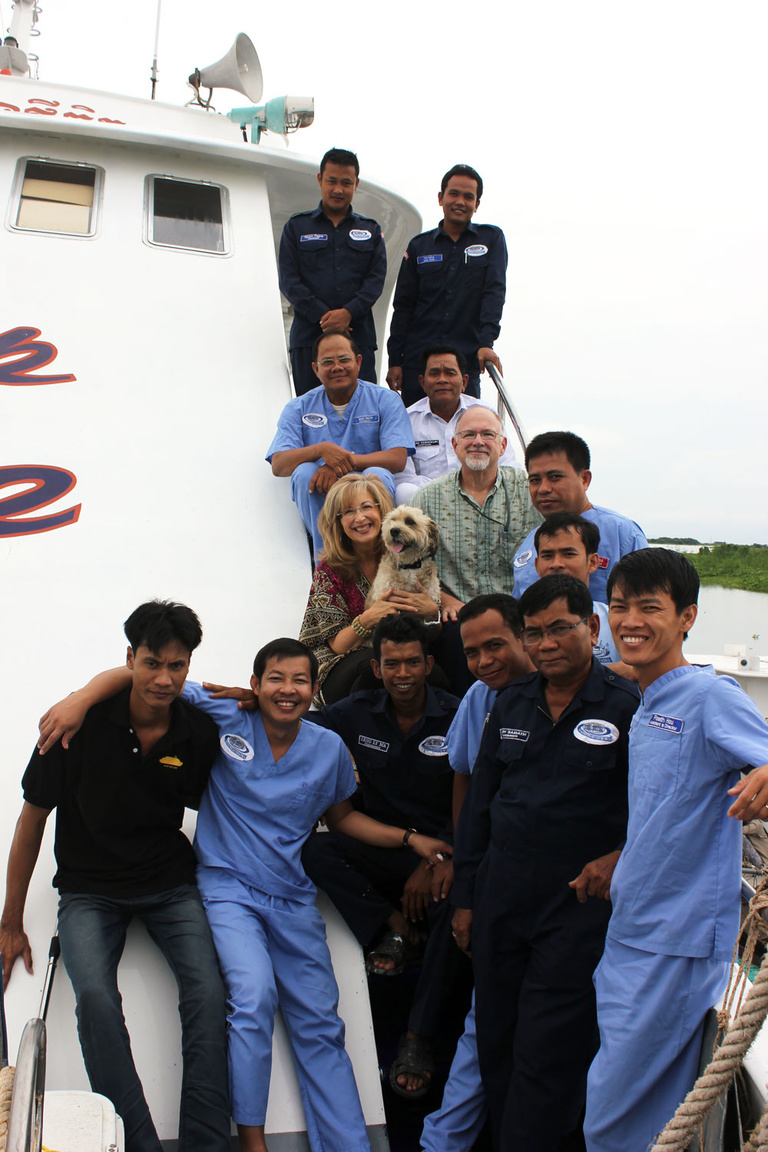Paul Pinckley’s recent career has been spent working in M.B.A. programs, where he helps students develop the skills they will need to succeed in their careers, often as corporate managers.

But his most recent position was about as far from corporate as you can get. For three years, he and his wife lived a Spartan existence managing a floating health care clinic that sailed the Mekong River, bringing badly needed health care services to remote, impoverished villages in Cambodia that have limited access to doctors, dentists, or pharmacists.
He says his experience provides valuable insight he can share with M.B.A. students.
“I seize every opportunity to talk about ways to give back and make our planet a better place,” says Pinckley, the new director of admissions and financial aid in Tippie College of Business’ full-time M.B.A. program. “They don’t have to go to the other side of the world, but they can make a difference. I make it a point to credit those who have been involved in socially responsible endeavors. This is an educational institution, and I hope we can instill a desire to make a difference in the world, not just the business world.”
Pinckley had worked in the M.B.A. admissions office at Pepperdine University in Malibu, California, for 10 years when he started wondering if he should be doing something else with his life. Leafing through his church-affiliated newspaper one day, he saw an ad seeking a volunteer manager for the Ship of Life medical mission and wondered if that was his calling.
Within months, he and his wife, Debbie, were 4,100 miles west, sailing the Mekong after selling most everything they owned in California, including their house. The Ship of Life is operated as part of the humanitarian mission of the Church of Christ, of which the Pinckleys are members. At 109 feet in length, it’s more of a yacht than a ship (“Trump’s is bigger,” he says), and it also houses the captain and crew of 13, along with the medical staff—a doctor, a dentist, and a pharmacist. Debbie served as assistant manager, and the onboard quarters where they lived were smaller than Pinckley's current office in the Pomerantz Center.
As manager, he made sure the ship was maintained, had the equipment and medicine needed to provide basic medical care, and filed whatever paperwork was necessary.
“My job had nothing to do with the medical or the nautical,” he says.
Pinckley made dozens of new friends of the Cambodians he met and was awed by the Mekong, the jungles it passed through, and the historical remnants they saw. He witnessed signs of the horrors the country endured in the 1970s in its wars against the U.S. and Vietnam and in the Khmer Rouge killing fields. He says it wasn’t unusual to see patients without limbs or carrying scars left over from the violence, and post-traumatic stress disorder is still common.
In the three years Pinckley served as manager, the Ship of Life saw more than 70,000 patients, most suffering from chronic headaches, insomnia, high blood pressure, or diabetes. Gastritis and parasites were also common because most rural Cambodians drink untreated water from sources that also serve as open sewers for human and livestock waste.
Two cases stand out from his tenure. The first was that of a woman with a gastric cyst the doctor said would kill her eventually but that required more advanced treatment than what they could provide on the Ship of Life. She was reluctant to visit a clinic, though, because she didn’t want to lose her job, and finally did only after much prodding.
At the ship’s next stop, they were met by the woman’s mother and uncle, who said they were forever grateful because the woman had visited a clinic and underwent emergency surgery to remove the cyst because she was that close to death.
“They gave us a big box of corn, coconuts, and other food, and that was very meaningful,” Pinckley says. “Had we not been there, she would have been dead.”
The second case was a patient who came in with asthma so severe and progressing so rapidly that he wasn’t able to get the advanced care he needed and died. The next day, the crew could hear the Buddhist chants from his funeral reverberating down the street. They haunted the doctor.
“I told him he did everything he could, that we weren’t set up to do more than provide the care that we provided,” he says.
Pinckley said the experience gave him a new appreciation for life and a new perspective on his job. He’s more patient now and has more understanding of other people and their circumstances.
“We all come from so many different directions, and everyone doesn’t come from the same place of privilege and comfort. I think I can better serve the students if I take the time to understand,” he says.
He found on his return home that the speed of American life can also be disorienting, and that the volume of stuff available in the United States can be overwhelming.
“When we moved to Iowa City and were furnishing our house, we kept asking ourselves, do we really need that table? Do we really need that chair?” he says.
More often than not, the answer was no.